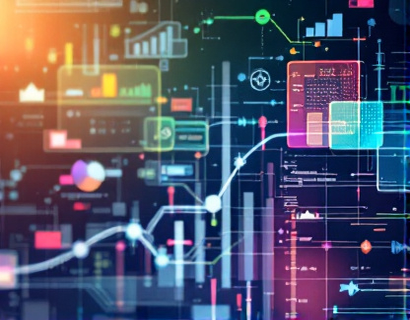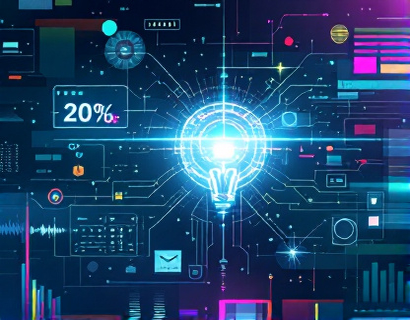Unlocking Digital Potential: Leveraging AI and Crypto for Enhanced Productivity Solutions
In the rapidly evolving digital landscape, professionals are constantly seeking ways to boost productivity and efficiency. The convergence of Artificial Intelligence (AI) and cryptocurrency presents a transformative opportunity to redefine how we approach work and manage tasks. This article delves into the ways AI and cryptocurrency can be harnessed to create smarter, more efficient solutions, benefiting tech innovators and early adopters who aim to stay ahead in the digital realm.
The Intersection of AI and Productivity
Artificial Intelligence has become an indispensable tool in the modern workplace. AI-driven solutions can automate repetitive tasks, provide insights through data analysis, and enhance decision-making processes. For instance, AI-powered virtual assistants can manage schedules, send reminders, and even draft emails, freeing up valuable time for more strategic activities. Machine learning algorithms can analyze patterns in work habits to suggest optimizations, such as the best times to tackle complex tasks or how to reduce distractions.
Moreover, AI can significantly improve content creation and management. Natural Language Processing (NLP) technologies can assist in writing, editing, and even translating documents, making communication more efficient and accessible. AI-driven project management tools can predict project timelines, allocate resources more effectively, and monitor progress in real-time, ensuring that projects stay on track and within budget.
Cryptocurrency and Decentralized Productivity Tools
Cryptocurrency, often associated with financial transactions, offers much more than just a digital currency. The underlying blockchain technology provides a decentralized, secure, and transparent framework that can revolutionize various aspects of productivity. Decentralized applications (dApps) built on blockchain can offer new ways to collaborate, store data, and manage workflows without the need for central authorities.
One of the key benefits of using cryptocurrency in productivity solutions is the enhancement of data security and privacy. Blockchain's immutable ledger ensures that once data is recorded, it cannot be altered or deleted, providing a tamper-proof record of transactions and interactions. This is particularly valuable in industries where data integrity is crucial, such as healthcare, finance, and legal services.
Smart Contracts for Automated Workflows
Smart contracts, self-executing contracts with the terms directly written into code, can automate and enforce agreements without intermediaries. In a productivity context, smart contracts can be used to automate workflows, ensuring that tasks are completed and rewarded as per agreed terms. For example, in a freelance setup, a smart contract can release payment to a freelancer once the client confirms the completion of a task, eliminating the need for manual invoicing and payment processing.
These contracts can also be integrated with AI to optimize processes further. For instance, an AI system can analyze past performance data to predict the likelihood of a task being completed on time and adjust the smart contract parameters accordingly, ensuring more efficient and reliable workflows.
Decentralized Storage and Collaboration
Traditional cloud storage solutions often centralize data, making them vulnerable to breaches and outages. Decentralized storage solutions, powered by blockchain, offer a more robust and secure alternative. These platforms distribute data across a network of nodes, ensuring that no single point of failure can compromise the entire system. This not only enhances security but also improves data availability and accessibility.
Decentralized collaboration tools built on blockchain can further enhance productivity by providing a transparent and tamper-proof environment for teamwork. These tools can track contributions, ensure fair compensation, and maintain a clear audit trail of all collaborative efforts. This is particularly beneficial for remote teams and projects that involve multiple stakeholders across different locations.
Tokenization of Assets and Incentives
The tokenization of assets through cryptocurrency allows for the creation of digital tokens that represent ownership or access to resources. In the context of productivity, tokens can be used to incentivize performance, reward contributions, and facilitate peer-to-peer transactions. For example, a token economy within a professional network can reward users for completing tasks, providing high-quality work, or contributing to the community. These tokens can then be used to access premium features, purchase services, or even traded for other cryptocurrencies.
Tokenization can also democratize access to resources and opportunities. Small businesses and independent professionals can tokenize their services or products, reaching a global audience without the need for intermediaries. This not only lowers barriers to entry but also fosters a more inclusive and dynamic economic ecosystem.
Challenges and Considerations
While the potential of AI and cryptocurrency in enhancing productivity is significant, there are several challenges and considerations to keep in mind. One of the primary concerns is the technical complexity involved in integrating these technologies. Organizations and individuals need to invest in training and development to fully leverage AI and blockchain solutions.
Another challenge is the regulatory landscape. Cryptocurrency and blockchain technologies are still evolving, and regulations vary widely across different regions. Compliance with local laws and standards is essential to avoid legal issues and ensure the sustainability of productivity solutions.
Privacy and security remain top priorities, especially when dealing with sensitive data. While blockchain offers enhanced security, it is crucial to implement best practices and use reputable platforms to mitigate risks. Additionally, the environmental impact of cryptocurrency mining, particularly proof-of-work systems, is a growing concern that needs to be addressed.
Future Trends and Innovations
The intersection of AI and cryptocurrency is a rapidly evolving field, with numerous innovations on the horizon. One promising area is the development of AI-powered blockchain analytics tools, which can provide deeper insights into blockchain transactions and help identify trends, fraud, and inefficiencies. These tools can be invaluable for businesses looking to optimize their use of blockchain technology.
Another exciting development is the integration of AI with decentralized finance (DeFi) platforms. AI-driven DeFi solutions can offer more personalized financial services, better risk management, and improved investment strategies. For professionals, this means access to a new set of tools that can enhance financial planning and management.
Furthermore, the rise of Web3, a decentralized internet powered by blockchain, promises to redefine how we interact online. AI will play a crucial role in making Web3 more user-friendly and accessible, ensuring that the benefits of decentralization are widely adopted. This includes AI-driven interfaces that simplify complex blockchain interactions and AI-powered security measures to protect users from emerging threats.
Conclusion
Leveraging AI and cryptocurrency offers a powerful combination to unlock new levels of productivity and efficiency. By automating routine tasks, enhancing data security, and creating decentralized collaboration environments, these technologies can transform the way professionals work and manage their tasks. While there are challenges to overcome, the potential benefits make it a worthwhile endeavor for tech innovators and early adopters. As the digital landscape continues to evolve, embracing these advancements will be key to staying competitive and achieving success in the modern workplace.











































